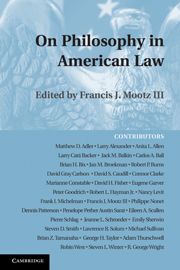Book contents
- Frontmatter
- Contents
- Introduction
- PART I KARL LLEWELLYN AND THE COURSE OF PHILOSOPHY IN AMERICAN LAW
- PART II PHILOSOPHICAL PERSPECTIVES ON LAW
- PART III AREAS OF PHILOSOPHY AND THEIR RELATIONSHIP TO LAW
- PART IV PHILOSOPHICAL EXAMINATIONS OF LEGAL ISSUES
- 18 Law as Premise
- 19 Doing Justice to Justice: Paul Ricoeur
- 20 Love Is All You Need: Freedom of Thought versus Freedom of Action
- 21 Legal Philosophy over the Next Century (While We Wait for the Personal Rocket Transportation We Were Promised)
- 22 Atmospherics: Abortion Law and Philosophy
- PART V LAW, RHETORIC, AND PRACTICE THEORY
- PART VI QUESTIONING THE RELATIONSHIP BETWEEN PHILOSOPHY AND AMERICAN LAW
- PART VII COMMENTARIES
- Contributors and Selected Bibliography
- Name Index
- References
19 - Doing Justice to Justice: Paul Ricoeur
Published online by Cambridge University Press: 31 July 2009
- Frontmatter
- Contents
- Introduction
- PART I KARL LLEWELLYN AND THE COURSE OF PHILOSOPHY IN AMERICAN LAW
- PART II PHILOSOPHICAL PERSPECTIVES ON LAW
- PART III AREAS OF PHILOSOPHY AND THEIR RELATIONSHIP TO LAW
- PART IV PHILOSOPHICAL EXAMINATIONS OF LEGAL ISSUES
- 18 Law as Premise
- 19 Doing Justice to Justice: Paul Ricoeur
- 20 Love Is All You Need: Freedom of Thought versus Freedom of Action
- 21 Legal Philosophy over the Next Century (While We Wait for the Personal Rocket Transportation We Were Promised)
- 22 Atmospherics: Abortion Law and Philosophy
- PART V LAW, RHETORIC, AND PRACTICE THEORY
- PART VI QUESTIONING THE RELATIONSHIP BETWEEN PHILOSOPHY AND AMERICAN LAW
- PART VII COMMENTARIES
- Contributors and Selected Bibliography
- Name Index
- References
Summary
What has law's justice to do with revenge, or revenge justice with law? Traditional readings of Aeschylus's Oresteia see the trilogy as marking the early triumph of the rule of law over revenge-driven violence personified as Furies (Erinyes). Thanks to the persuasive wisdom of Athena in establishing the first dicastic court, these savage beings are transformed into Eumenides – “kindly ones” – and installed in a place of honor beneath the Areopagus from whence they will serve as guardians of dike (justice). A closer reading suggests another darker possibility: that revenge violence continues to reside at the heart of the very institution that claims to have tamed it. In Athens, litigants often used the court system as a means to continue blood feuds (Cohen 1995). And through the ages law has been used as an instrument of torment, as demonstrated by Shylock's effort in the Merchant of Venice to use civil law against Antonio's flesh to right his shame suffered at the hands and mouth of Antonio. The Furies, far from being tamed or banished, continue to reside at the heart of law. For Paul Ricoeur, these archaic symbols of revenge violence give rise to his thinking about justice that bears fruit in his final works.
Ricoeur (1992: 197) suggests that the “just faces in two directions: towards the good, with respect to which it marks the extension of interpersonal relationships to institutions; and toward the legal, the judicial system conferring upon the law coherence and the right of constraint.”
- Type
- Chapter
- Information
- On Philosophy in American Law , pp. 159 - 166Publisher: Cambridge University PressPrint publication year: 2009



